Impossible Foods unveils 2019 impact report, defends GM soy: ‘Cows aren’t getting any better at making meat. We are’
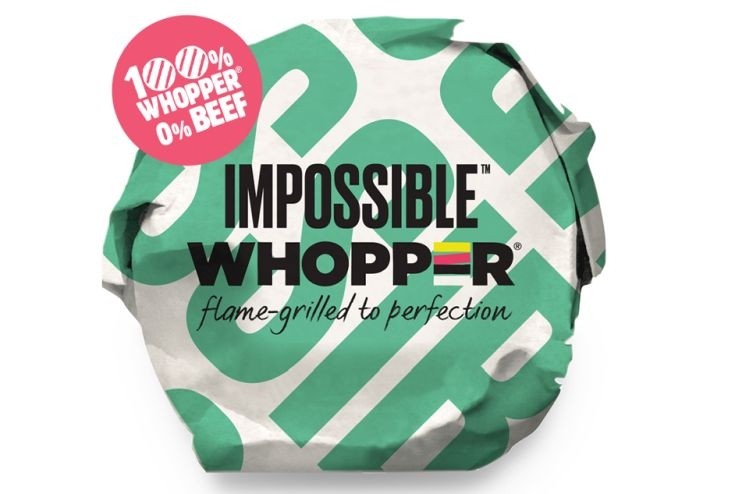
Speaking to FoodNavigator-USA after releasing its 2019 Impact Report, Impossible Foods senior manager of impact strategy Rebekah Moses said: “We have done a tremendous amount of diligence and we’re confident that in using GMO soy, we are not taking a step backward in terms of sustainability.
“Soy is really high yielding, it’s a good source of protein and it’s more efficient than wheat [the core ingredient in the first version of the Impossible Burger]. You get so much more protein in a given harvest vs the amounts of water, energy and inputs needed to grow it.”
Asked about the sustainability credentials of GM (herbicide tolerant) soy vs non-GMO (ie. conventional) soy, she said: “Everything is very field-based, but at a high level, there is very little if any difference in the environmental impact of conventional vs herbicide tolerant soy and in some cases using herbicide tolerant soy enables you to adopt more sustainable practices such as the ability to reduce tillage, which is a win for the soil.
“Similarly, the chemicals you spray to manage pests – that includes insects and weeds - in herbicide tolerant crops are lower toxicity than the alternatives [used to grow conventional soy].”
Asked why the company had picked soy - which it sources from farms in Iowa, Minnesota and Illinois - over peas, for example, she said:
“Soy is objectively an excellent source of high quality protein that fixes its own nitrogen – although it’s not alone in that – and it has very high yields. But I’d never say one is inherently more sustainable than the other as there are a million different ways of weighing what that means in a specific context.”
She also noted that the deforestation associated with soybeans was due to crops grown for animal feed, adding: “The vast majority of soy is grown for animal feed. No one is cutting down rainforests so we can make tofu or plant-based burgers.”
Stringent standards
Asked about glyphosate residues, the company said it monitored its products for 300+ pesticides (including glyphosates) and other contaminants, adding: “Our standards are far more stringent than the standards set by the EPA, USDA and FDA, and orders of magnitude below the levels that would pose any risk for consumers.”
Plant-based meat uses less water and land, and generates fewer greenhouse gases
When it comes to comparing Impossible Foods’ plant-based burgers vs beef burgers from slaughtered cows, meanwhile, even the most efficient beef production systems use significantly more land and water, and generate more greenhouse gas emissions, claimed the impact report.
And as a cow needs to eat about 30 pounds of corn and soy for every pound of beef it produces, far less herbicide is needed to make an Impossible Burger than a beef burger, added the report, which was published as AT Kearney issued a report predicting that "around one-third of the global meat supply will be provided by these new technologies [plant-based or cultured meat] within the next 10 years."
A lifecycle analysis conducted by sustainability consultancy Quantis revealed that the latest version of the Impossible Burger, which features soy protein concentrate as its primary ingredient (replacing wheat) uses 87% less water, 96% less land, and generates 89% fewer GHG emissions and 92% less dead-zone creating nutrient pollution, vs a beef burger “made using even the most environmentally efficient cattle-based production.
“Comparative greenhouse gas estimates don’t even include the huge carbon sequestration potential of land spared from cattle grazing -- perhaps the most critical immediate GHG benefit.”
Regenerative grazing ‘not sustainable at scale’
The company also launched a stinging attack on proponents of regenerative grazing, claiming that theories espoused by Allan Savory at the Savory Institute had been “thoroughly debunked,” and arguing that grassfed beef generates more GHGs than industrial feedlot beef.
Advocates of regenerative grazing argue that rather than feeding animals grains (which generate their own carbon footprint and take up agricultural land), grazing ruminant animals (eg. cows, bison, sheep etc) eat grass, and fertilize the soil with their manure, while holistic farming practices support wildlife biodiversity, sequester carbon in the soil, hold groundwater and build topsoil.
They also observe that grazing animals can utilize marginal land otherwise unable to grow food.
While Impossible Foods supports holistic farming practices, and is not against ‘regenerative agriculture’ per se, it does not believe that regenerative grazing can satisfy global demand for meat sustainably, says the report.
“Regenerative grazing may beat industrial bovine strip mining on a couple of fronts - but it’s all still rooted in the same inefficiency of animal metabolism… Whatever the branding - regenerative grazing, holistic grass-fed beef, ‘carbon positive’ grazing - none are sustainable at scale, and all are insufficient to feed the growing demand for meat and dairy products.
“Diligent stewardship of herd density and rangeland health is better than unchecked and unmanaged animal farming -- but compared to the intact natural ecosystem that it disrupts, livestock grazing competes with wildlife for space and for food, contributes to erosion, and through feeding, converts vegetation that would otherwise capture carbon into a source of greenhouse gases.”
‘Less than a quarter of US beef demand could be met with grass-fed production’
In most cases, claimed Impossible Foods, “Industrial feedlot beef actually requires less natural resources and generates less greenhouse gas than does grassfed beef.
“And, there’s no way to feed the market: recent research has demonstrated that less than a quarter of US beef demand could be met with grass-fed production, and doing so would pump out more than 40% more GHGs than the current industrial system.”
"This is not the first, nor will it be the last, attempt to discredit Allan Savory‘s work as a sleight-of-hand for promoting and profiting off of large scale industrial agriculture. Claims that Allan‘s work has been debunked overlook not just the millions of acres that have been regenerated globally, but also the growing body of peer-reviewed evidence documenting that properly-managed livestock can be a net positive for grassland ecosystems, carbon drawdown, wildlife habitat, and rural communities.
"Timely enough, a third-party lifecycle analysis was recently conducted at White Oak Pastures, a Savory Hub in southern Georgia, showing their holistically-managed beef, when taking a full accounting of all greenhouse gases in and out of their farming operation, was a net carbon sink. In a world where current agricultural practices have eroded soils to the point of having less than 60 harvests left (according to the UN FAO), the solution is not to maximize efficiencies in the broken, extractive, industrial model. Rather, we must address the root cause and adopt land management practices that honor the symbiotic relationships of plants and animals. Only then will we create a lasting and regenerative agricultural model for a livable planet."
Bobby Gill, director of development and communications, The Savory Institute
“Impossible foods—which makes the Impossible Burger with GMO soybeans doused with Roundup, has a long way to go to truly understand its environmental impact. Glyphosate, the active ingredient in Roundup, is not only a probable carcinogen, but is actively destroying the microbial communities in our soil, threatening our biodiversity, and permeating our water supply.
"The unfortunate reality is that most GMO corn and soybeans grown in the US are monocropped, and use extensive synthetic, fossil-fuel-intensive, fertilizers. Runoff from the farms in the Midwest—where Impossible Foods buys their soybeans—is contributing to a dead zone in the Gulf of Mexico the size of New Hampshire.
"If Impossible Foods wants to be an environmental leader—we urge them to use only certified organic soybeans and other materials in their products. For animal agriculture—factory farming, also known as Controlled Animal Feeding Operations, or CAFOs, is one of the most destructive forms of agriculture on the planet. However, getting animals outside, on pasture, is part of farming with nature. Regenerative organic agriculture uses animals to improve soil health, often using marginal land that could not be used for other crops. Studies have shown that animals grazing on pasture sequester carbon, a greenhouse gas emission, and can be part of the solution to mitigating and reversing climate change.”
Jeff Moyer, executive director, The Rodale Institute
"We suspect Impossible Foods’ officials felt it convenient to leave out mention of the third-party lifecycle analysis that was recently released from studies conducted at White Oak Pastures, a Savory Hub in southern Georgia, which the Savory rebuttal also noted. Analysis results showed White Oaks produced a net carbon sink—in spite of all greenhouse gases coming in and out of the farm operation. The study was performed by Quantis, the same third-party firm that conducted Impossible Burger’s latest LCA and which showed Impossible’s product to be a net carbon emitter.
We at AGA believe communities should be feeding communities—with real food, grown in concert with nature, with an eye toward the health of consumers, the welfare of animals, the stewardship of land, and the future of our world. If consumers have to eat less meat? We’re fine with that, as long as what they are eating is clean, real protein, raised in harmony with—and to the benefit—of nature.
"In the end, Impossible Foods’ 2019 Impact Report does what it was intended to do: To deflect negative attention from its GMO soy-based products in order to write a new narrative that sells more impossible-to-defend Impossible “burgers”—an endeavor that does nothing but benefit the bottom line of an industrial food company."
Carrie Balkcom, executive director, American Grassfed Association
Younger consumers are more agnostic about the source of their ‘meat’
As for consumer appeal, while the beef burger holds a sacred place in the US diet, younger Americans are more agnostic than their parents about the source of their meat, claimed the report.
Younger consumers are “less inclined to believe that eating meat from animals is part of the American identity, or that plant-based products won’t taste good. What parents feed their children influences future tastes, and younger parents are more likely to purchase plant-based meats than older parents.”
While Impossible Foods is motivated by a desire to reduce animal suffering and reduce the environmental impact of meat production, however, the whole point of developing products that precisely mimic meat is that consumers don’t have to compromise, added Moses.
In other words, if you make something so good that people like it equally to regular meat, or even prefer it, they don’t have to care about saving animals or the planet, she said.
“We’re making change agents out of consumers even if sustainability isn’t on their radar.”
‘We need to double our production, sales and impact every year for the next 16 years’
The report was published as analysts at Bernstein cited an “overwhelming number of complaints on Impossible Foods' Facebook page about its inability to serve smaller restaurants, while prioritizing larger QSR chains,” as it struggled to keep up with unprecedented demand for its plant-based burgers.
To achieve its lofty goal - “to replace the use of animals as a food-production technology, globally, by 2035” – said the firm, which is working on meat and dairy alternatives but hasn’t said whether eggs or fish are in its R&D pipeline, “We still need to scale up more than 100,000- fold. That means that on average, we need to double our production, sales and impact every year for the next 16 years.”
But it added: “Our decisive advantage over the incumbent industry is our ability to continue improving our products, processes and supply chain, in every way that matters to consumers and the environment -- week by week, year by year, far into the future.
“Cows aren’t getting any better at making meat. We are.”
Impossible Foods recently introduced reverse osmosis technology to capture and reuse the water used to separate its star ingredient ‘heme’ from the yeast and fermentate and continues to improve yields such that it can further reduce its water and energy footprint. It is also replacing its CIP (clean-in-place) equipment with more efficient equipment and continuing on its path toward US Green Business Council (USGBC) Zero Waste Certification.



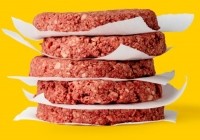
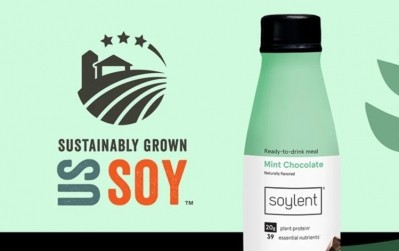
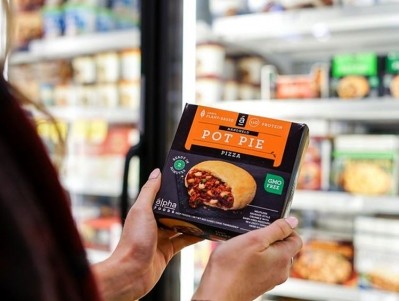
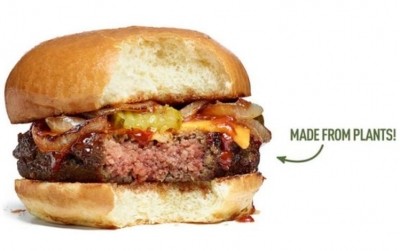
![Good Food Institute: 'We expect category growth [in plant-based meat] to accelerate significantly over the coming 12 months.' (Picture: Impossible Foods)](/var/wrbm_gb_food_pharma/storage/images/_aliases/wrbm_medium/publications/food-beverage-nutrition/foodnavigator-usa.com/article/2019/07/16/us-retail-sales-of-plant-based-meat-up-9.6-yoy-but-growth-has-decelerated/9923052-1-eng-GB/US-retail-sales-of-plant-based-meat-up-9.6-YoY-but-growth-has-decelerated.jpg)














